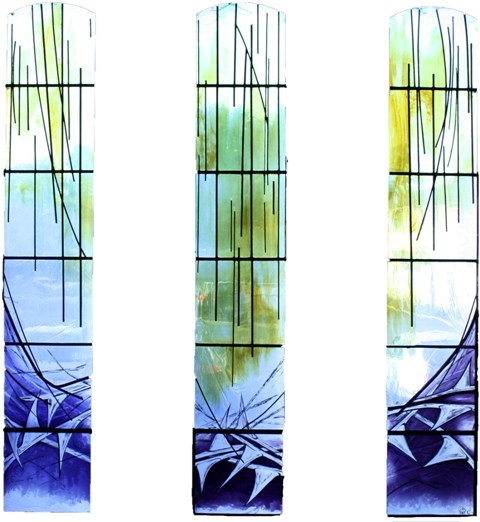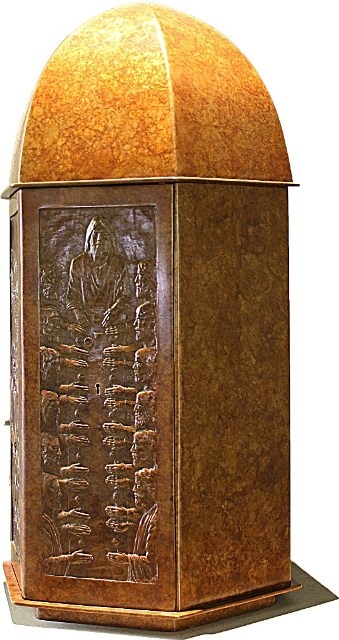The Blessed Sacrament Chapel.

The Place for the Reservation of the Most Holy Eucharist.
In accordance with the structure of each church and legitimate local customs, the Most Blessed Sacrement should be reserved in a tabernacle in a part of the church that is truly noble, prominent, readily visible, beatuifully decorated and suitable for prayer. The one tabernacle should be immovable, be made of solid and inviolable material that is not transparent, and be locked in such a way that the danger of profanation is prevented to the greatest extent possible. However, it is appropriate that, before it is put into liturgical use, it be blessed according to the rite described in the Roman Ritial.
General Instruction of the Roman Missal, 314.
In accordance with traditional custom, near the tabernacle a special lamp, fuelled by oil or wax, should be kept alight to indicate and honour the presence of Christ.
General Instruction of the Roman Missal, 316.
Not part of the original design of the church, the Chapel was created to give due honour the Real Presence of Christ in the reserved Blessed Sacrament. It was felt that in its previous location, at the rear of the sanctuary beneath the crucifix, the tabernacle, which, in the words of Pope Paul VI, is "the living heart of each of our churches", tended to get lost amidst the other furniture on the sanctuary. The present arrangement allows for a more personal devotion to the Blessed Sacrament that was previously possible and for more frequent exposition – as stated in the Code of Canon Law: "The tabernacle in which the blessed Eucharist is reserved should be sited in a distinguished place in a church or oratory, a place which is conspicuous, suitable adorned and conducive to prayer."
The new tabernacle was a special commission for the parish and it is unusual in that it has two sets of double doors. The rear doors allow access to the reserved Blessed Sacrament in the usual way while the front doors open to reveal a host mounted in a lunette for exposition. The scenes depicted on the doors, in shallow relief, depict scenes from scripture relating to the institution of the Eucharist: Moses feeding the Israelites in the desert, the feeding of the five thousand with five loaves and two fish, the Last Supper, and Christ and the two disciples on the Road to Emmaus. The insides of the doors that open for Eucharistic Exposition are engraved with angels after Fra Angelico. The Eucharistic theme is continued on the wall behind the tabernacle in a relief with crossed hands holding sheaves of wheat surrounded by bunches of grapes, the colour of the hangings beneath is changed according to the season or feast being celebrated.

The stained glass in the Blessed Sacrament Chapel is again another special commission and the final design was chosen out of a short-list of three by a ballot of parishioners. Made by Jane Campbell, A.M.G.P., the crown of thorns and the purple colour in the lower portion of the three panels represents present suffering while the gold coming from above represents the hope of future glory the window casting a striking light across the sanctuary in the evening sun. The planned blessing of the window almost did not happen. The day before the blessing, when the window was being installed, a ladder was put through one of the panes with the expected unfortunate results. All credit is due to the artist who worked through the night to ensure that the window was in place for the blessing.
Also, usually, in the Blessed Sacrament Chapel is the casket that contained the relics of St. Clemet and St. Severus and that was carried shoulder high by two deacons in solemn procession around the church at the Consecration Mass. Made by a parishioner out of wood re-cycled from a dismantled bar the casket is now used to post petitions for pilgrimages and for the names of deceased friends and relations in the November list.
Prayer for a Visit to the Blessed Sacrament.
Saint Alphonsus Liguori (1696-1787).
My Lord Jesus Christ, who for the love which You bear us, remain night and day in this Sacrement full of compassion, calling, and welcoming all who come to visit You, I believe that You are present in the Sacrament of the Altar. I adore You from the abyss of my nothingness, and I thank You for all the graces which you have bestowed upon me and in particular for having given me Your most holy Mother Mary as my Advocate, and for having called me to visit You in this church. I now salute your most loving Heart; and this for three ends: first, in thanksgiving for this great gift; secondly, to make amends to You for all the outrages which You receive in this Sacrament from all Your enemies; thirdly, I intend by this visit to adore You in all the places on earth in which You are present in this Sacrament and in which you are the least reserved and most abandoned. My Jesus, I love You with all my heart. I grieve for having hitherto so many times offended Your infinite goodness.I purpose by Your grace never more to offend You for the time to come. And now, miserable and unworthy though I may be, I consecrate myself to You without reserve; I give You and remounce my entire will, my affections, my desires, and all that I possess. Henceforward, dispose of me and of all that I have as You please. All that I ask of You and desire is Your holy love, final perseverence and the perfect accomplishment of Your will. I recommend to You the souls in Purgatory, ane especially those who had the greatest devotion to the Blessed Sacrament, and to the most Blessed Virgin Mary. I also recommend to You all poor sinners. Finally, ny dear Saviour, I unite all my affections with the affections of Your most loving Heart, and I offer them, thus united, to Your Eternal Father, and beseech Him in Your name to vouchsafe for Your love, to accept and grant them.

Visit to the Blessed Sacrament before Meditation.
John Henry Cardinal Newman (1801-1890).
I place myself in the presence of Him, in whose Incarnete Presence I am before I place myself there. I adore You, O my Saviour, present here as God and as man, in soul and in body, in true flesh and blood. I acknowledge and confess that I kneel before that Sacred Humanity, which was conceived in Mary's womb, and lay in Mary's bosom; which grew up to twelve, wrought miracles, and spoke words of wisdom and peace; which in due season hung on the cross, lay in the tomb, rose from the dead, and now reigns in heaven. I praise, and bless, and give myself wholly to Him, who is the true Bread of my soul, and my everlasting joy.
Panis Angelicus.
Angels' Bread is made the Bread of mortal man; shows forth this heavenly Bread the ends which types began; O wondrous thing indeed!. Upon his Lord how can a poor and humble servant feed!
Ave Verum.
Ascribed to Pope Innocent VI (Pont. 1352-1362).
Hail true body that was born of Mary, the Virgin, that truly suffered and was offered in sacrifice on the cross for man and that gave forth true bolld from its pierced side. Be to us a foretaste of heaven when we are in death's agony, kind, loving and gentle Jesus, son of Mary.
Adoro Te Devote.
Ascribed to Saint Thomas Aquinas (1225-1274).
I adore you devotedly, Godhead unseen, who truly lies hidden under these sacramental forms. My soul surrenders itself to you without reserve, for in contemplating you it is completely overwhelmed. Sight, touch, and taste are no guide in finding you, and only hearing is a sure guide for our faith. I believe everything that the Son of God has said, and nothing can be truer than his word of Truth. Only the Godhead was hidden on the cross, but here the humanity is hidden as well. Yes, I believe and acknowledge them both and make the same request as the repentant thief. I do not see the marks of the wounds, as Thomas did, and yet I, too, own you as "My God." Grant that I believe in you more and more, that I put my hope in you and that I love you. Living Bread, that ever recalls the Lord's death and gives life to His servants, gtant to my soul to live by you and always to taste your sweetness. Lord Jesus, loving Perfection of heaven, clense me, a sinner, with your blood; for a single drop can save the whole world from all its sin. Jesus, as I look on your veiled presence, I pray that what I long for so ardently may come about, and that I may see your face unveiled and be happy in the vision of your glory.
Pange Lingua.
Saint Thomas Aquinas (1225-1274).
Praise, my tounge, the mystery of the glorious Body and of the precious Blood which the king of nations, fruit of a royal womb, poured out as the world's ransom. To us He was given, to us He was born of a pure virgin. He lived in the world and when He had spread the seed of truth, He closed in a wondrous way the period of His sojourn here. As Hi is reclining with his bretheren on the night of the last supper, he complies completely with the Law in regard to legal foods and then gives Hinself with His own hands as food to the group of twelve. The Word made flesh by a word changes true bread into His flesh, and wine becomes His blood. If man cannot percieve this change, faith is itself enough to convince the well-dosposed. Let us, therefore, humbly reverence so great a sacrament. Let the old types depart and give way to the new rite. Let faith provide her help where all the senses fail, To the Father and the Son be praise, acclamation, salvation, honour and blessing, too. To the One who proceeds from them both be given equal praise.